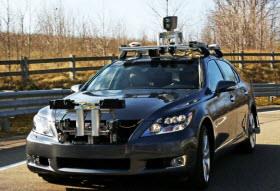Agency seeks to provide safety guidelines while also encouraging the technology.
 The federal government doesn't want states to license self-driving cars for average drivers, at least not in the near term.
The federal government doesn't want states to license self-driving cars for average drivers, at least not in the near term.
In a statement released Thursday, the National Highway Traffic Safety Administration said that more data is needed before self-driving cars can be expanded beyond testing, as they're currently allowed in Nevada and California.
The agency added that it plans to study the technology over the next four years to decide if automakers are sufficiently focusing on safety prior to making autonomous vehicles available to the public.
“Whether we’re talking about automated features in cars today or fully automated vehicles of the future, our top priority is to ensure these vehicles -- and their occupants -- are safe,” Transportation Secretary Ray LaHood said in the statement.
And as with NHTSA Administrator David Strickland’s initial comments on self-driving cars at a meeting in Washington, D.C. last October, the agency also laid out what it sees as five levels of autonomous driving technology -- and the highest level is already on the road.
According to NHTSA, Level 0 is for cars in which the driver is in complete control at all times, while Level 1 includes vehicles with common safety features such as stability control and brake assist. Level 2 cars have at least two automated functions, such as adaptive cruise control and lane departure prevention, and Level 3 incorporates what NHTSA called "limited self-driving automation" in which the vehicle takes over critical safety functions, such as collision avoidance with autonomous braking and the “driver is available for occasional control.” The 2014 BMW X5 has a feature called "Traffic Jam Assistant" that fits into this category.
Level 4 is described as "full self-driving automation," with the driver not expected to be available for control at any time during the trip.” Google and automotive supplier Continental have already logged tens of thousands of miles on public roads in Level 4 vehicles.
Several states have also already made testing of Level 4 autonomous cars legal. In its recommendations, NHTSA indicated that the agency plans to be proactive in providing guidelines to states.
The agency recommended that states not permit self-driving vehicles on public roads with the exception of testing, although most state laws already have this limitation. NHTSA also recommended that states require drivers testing self-driving cars to get extra training and special licenses to prove that they can safely operate the vehicles on public roads.
But NHTSA also cautioned states against overly regulating self-driving technology, because it is still evolving very rapidly and the agency sees lots of potential in technology leading to fewer accidents.
“As additional states consider similar legislation, our recommendations provide lawmakers with the tools they need to encourage the safe development and implementation of automated vehicle technology,” Strickland said.
NHTSA’s comments come as automakers such as Audi, BMW, Mercedes-Benz, General Motors and Toyota have talked about bringing autonomous cars to market. And self-driving innovation -- and potential competition -- is also emerging from outside the traditional auto industry in the form of Google.
autos.msn.com
No comments:
Post a Comment